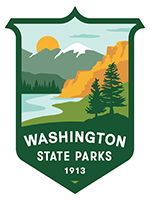The Parks headquarters Information Center is moving from its current location in Tumwater to the Department of Ecology building at 300 Desmond Drive SE in Lacey. Our customer service team is located at the front desk, just inside the main entrance.
Search results
1067 results found
Hugging the shore of 17-foot-deep Deep Lake, Millersylvania State Park is notable for its many well-preserved park structures built by the Civilian Conservation Corps in the Great Depression of the 1930s.
Squilchuck State Park is nestled in a mountain valley southeast of the city of Wenatchee in Central Washington.
OLYMPIA – The Washington State Parks and Recreation Commission will hold its regularly scheduled commission meeting virtually on March 6.
The North Lot features approximately 6.5 miles of non-motorized trails for cross country skiing and snowshoeing.
The South Lot features a 150' sled hill and approximately 8.5 miles of non-motorized trails for snowshoeing, cross country skiing. These trails connect with the Nason Ridge Sno-Park.
SPOKANE – After several months of conversation with the community, the Washington State Parks and Recreation Commission developed its preliminary land use plan for the potential boundary expansion of Riverside State Park.
Tolmie State Park provides access to the shores and undersea gardens of southern Puget Sound. The winding saltwater passageways of the South Sound, including Nisqually Reach in front of the park, were molded and scoured by glacial meltwaters at the close of the Pleistocene ice age.
Olallie State Park preserves the heritage of the South Fork Snoqualmie River Valley and its uses as a travel corridor across today’s Washington State. The river runs through the park, creating its biggest attractions where it cascades over the bedrock at 77-foot Weeks Falls and 230-foot Twin Falls. The two waterfalls are also the sites of the only hydroelectric developments in Washington State Parks.
By Holly Sproul (Parks Forms Manager & Web Specialist) & Nephew Evan (Age 9)
After soaking up the sun at Sun Lakes-Dry Falls State Park, we ventured to the westside of the mountains to cool off at Fort Worden Historical State Park in Port Townsend.
LACEY — The Washington State Parks and Recreation Commission will hold its regular commission meeting on July 17 at its headquarters in Lacey.
Schafer State Park preserves the craftsmanship of Depression Era park facilities and provides a window into the story of the Satsop River Valley, dominated by the vast timber harvest operations that were undertaken in its rich forest land beginning in the early 20th Century.
